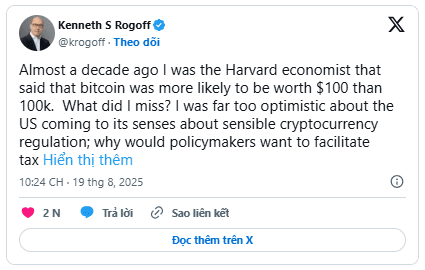Kenneth Rogoff, the Harvard economist who claimed in 2018 that Bitcoin was more likely to drop to $100 than rise to $100,000, has returned. He indirectly acknowledged that he was wrong and clarified the reasons why his prediction failed.
Harvard Economist Speaks Out About Mistaken Prediction on Bitcoin
In a post on X, Rogoff identified himself as the Harvard economist who said Bitcoin was more likely to be worth $100 than $100,000. He then went on to comment on what he missed when making this prediction. First, this economist said he was too optimistic about the U.S. recognizing the importance of reasonably regulating cryptocurrencies.

Rogoff, the former chief economist of the International Monetary Fund (IMF), pointed out that the Donald Trump administration mishandled the regulation of Bitcoin and cryptocurrencies. He questioned why policymakers would want to facilitate tax evasion and illegal activities, which could be related to regulations like the GENIUS Act, which has brought regulatory clarity.
It is worth mentioning that one of the reasons the Harvard economist predicts Bitcoin is likely to rise to $100 is based on his belief that government regulation will cause prices to drop. He made this prediction when BTC was trading at around $11,000. Rogoff stated at that time that this leading cryptocurrency needed to be globally regulated to prevent its use for money laundering.
The former IMF director believes that if this regulation eliminates the ability for money laundering and tax evasion, then the practical application of Bitcoin in transactions will be very small. Therefore, he believes that BTC will not have demand, which will cause its price to decrease rather than increase.
However, that did not happen as government regulation only increased the demand for Bitcoin. This leading cryptocurrency rose to $100,000, a price that Rogoff predicted would not be reached, for the first time last year after Donald Trump's victory. Meanwhile, BTC reached new heights thanks to regulatory clarity, including a price surge to a previous all-time high (ATH) just before the GENIUS Act was passed last month.
Other Reasons for the Missed Prediction
The Harvard economist also stated that he does not believe Bitcoin will compete with fiat currency to become the preferred medium of exchange in the $20 trillion global underground economy. He added that this demand sets a price floor for the currency.
In addition to being a preferred medium of exchange, BTC is also known as a store of value, creating demand for this currency among traditional financial investors (TradFi). These investors have primarily approached Bitcoin through ETF funds. Interestingly, Harvard recently announced a $117 million investment in BlackRock's BTC ETF.
Finally, Rogoff said he did not foresee a scenario where regulators, especially senior regulators, could blatantly hold hundreds of millions or even billions of dollars in cryptocurrency without facing any consequences, considering the 'blatant conflict of interest.'

